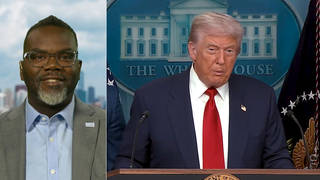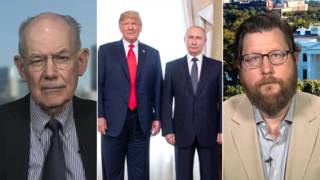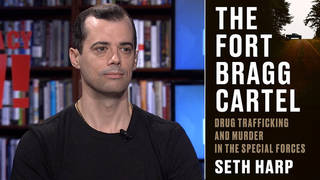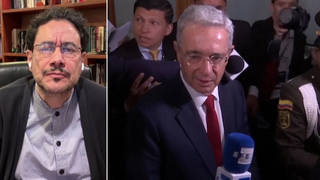
Guests
- Jeremy Scahillco-founder of The Intercept, where he is a senior correspondent and editor-at-large, and host of the podcast Intercepted.
We continue our conversation with The Intercept’s Jeremy Scahill, who just published a groundbreaking new project on Joe Biden’s decades-long foreign policy record. Scahill says that during his years in the U.S. Senate, Biden “almost never meets a war he doesn’t support,” becoming one of the most hawkish figures in Washington in the 1990s and 2000s. Scahill also discusses Biden’s “war against whistleblowers,” from Daniel Ellsberg to Edward Snowden.
More from this Interview
- Part 1: “Empire Politician”: Joe Biden’s Half-Century Record on Foreign Policy, War, Militarism & the CIA
- Part 2: Jeremy Scahill: Joe Biden’s Foreign Policy Record Shows Evolution of U.S. Empire Since Vietnam War
- Part 3: Jeremy Scahill on Biden’s “War Against Whistleblowers,” from Daniel Ellsberg to Edward Snowden
Transcript
AMY GOODMAN: This is Democracy Now!, democracynow.org, The Quarantine Report. I’m Amy Goodman, with Juan González. By the way, you can watch, listen and read transcripts using our iOS and Android apps. Download them for free from the Apple App Store or Google Play Store today. And you can get our daily news digest. Just text the word “democracynow” to 66866.
We’re continuing our discussion with The Intercept's Jeremy Scahill, who has just launched a massive new online investigative project titled “Empire Politician: A Half-Century of Joe Biden's Stances on War, Militarism, and the CIA.”
I wanted to go to the 1980s, Jeremy, and also talk about how that links to Joe Biden today. Now, in his address tonight, his first address to the joint session of Congress, it’s expected he’ll be mainly focusing on domestic policy. There, Congressmember Alexandria Ocasio-Cortez says that President Biden is more progressive than many progressives expected. But we’re talking about his foreign policy.
So, today, in headlines, we talked about a trial that’s going on in El Salvador on the 1981 El Mozote massacre, that horrifying massacre of around 1,000 Salvadorans killed by the Atlacatl Battalion, which was a U.S.-trained Salvadoran military battalion. One of the expert witnesses, Terry Karl, professor at Stanford, detailed the on-site presence of U.S. military adviser Allen Bruce Hazelwood in some of the pretrial testimony. This is extremely significant, what’s happened back then and what’s happening today.
Also, this goes to media criticism. You had Ray Bonner of The New York Times writing, eventually, about this massacre. And within months, because of enormous pressure from the Reagan administration, A.M. Rosenthal, then one of the chiefs at The New York Times, pulls him from covering Central America because he’s exposing what happened in El Salvador.
So, you’ve got the U.S. policy in El Salvador. You’ve got the support for the Contras; in Guatemala, what the U.S. did in its support of the both murderous military and the paramilitary death squads.
And then you look at what’s happening today with, from that very area, the number of immigrants who are fleeing north, and the connection between immigration today and U.S. policy and intervention of the 1980s — not to mention what’s going on with Venezuela with the Biden administration saying they recognize as president not the democratically elected leader, but, in fact, the person that both President Trump and, before that, Democrats also supported. Talk about the policy of yesteryear determining today, and how, in some ways, that isn’t changing, and where you see openings.
JEREMY SCAHILL: Well, I think it’s important to say, because this portion of history often doesn’t get mentioned, that in terms of El Salvador and U.S. administrations, Jimmy Carter emerged, even though he had campaigned on a pledge to sort of confront dictatorships and to respect human rights, as the original supporter of the coup regime that took power in 1979 in El Salvador, and the subsequent killing of protesters started this civil war. Carter, and particularly his national security adviser, Zbigniew Brzezinski, believed that this is a communist menace, or at least they said that it was. And they said, “Oh, if we don’t support this military regime in El Salvador, we’re going to end up with a Sandinista-style government. Cuba is going to run the deck on Central and Latin America.”
And you have powerful voices in the Catholic Church, such as Archbishop Óscar Romero of San Salvador, who himself was a conservative Catholic until the 1979 coup takes place — he writes to Jimmy Carter, pleading with him not to support the military junta. And Jimmy Carter’s administration ignores Archbishop Romero. And, in fact, Zbigniew Brzezinski writes to the pope, Pope John Paul II, and says, essentially, “You need to shut Óscar Romero up. You know, he’s starting to sound like a communist, and we’ve warned him about this.” Well, a month after Archbishop Romero writes to Carter a personal letter pleading with him not to send weapons and Huey attack helicopters to the junta, Óscar Romero is assassinated, shot through the heart, while he was saying Mass — a month after he writes to Jimmy Carter.
Joe Biden, at the time, was a critic of the military junta in El Salvador, but he also accepted the framework of the war against communism. And Biden could have become a really militant voice, especially as a Catholic. An overtly Catholic politician could have really gone to town on the fact that nuns, Catholic nuns, including U.S. citizens, were being raped and murdered by what was effectively a client state of the United States.
And eventually, Carter temporarily stops the aid to El Salvador, and he is defeated then in the election by Reagan. Biden writes to Reagan, in a very polite manner, saying, “I think we should maybe link our funding and arming of the Salvadoran dictatorship to investigating the murders of American citizens.” Carter, on his way out the door, gives emergency resumption of military gear and weaponry and financing to the Salvadoran junta. And Reagan takes power, and then it’s the gloves come off, and it’s just a massive bloodshed in El Salvador, sponsored in part by the United States.
And what you see is Joe Biden, on the one hand, denouncing the extrajudicial killings and murder, and, on the other hand, trying to tinker on the edges of American policy, proposing, “Mr. Reagan, I’ll support financing this dictatorship, or in the case of Nicaragua, I can agree to support the Contras, if we put this restriction on it or we make sure that they only spend it in this way.”
And I think that this was a crucial point of development for Joe Biden on questions of war. He almost never meets a war he doesn’t support. And the one time he did oppose a war, in 1991, Gulf War, he regretted it and then immediately became any ultra-hawk after it. But in the '80s, Biden was making deals on these really dirty questions of dictatorships and death squads. And he played a significant role, in terms of his position in the Senate, in not having a very clear line in the sand drawn: “We don't support dictators. We don’t support death squads.” Biden helped negotiate compromises with Reagan rather than just militantly opposing it.
JUAN GONZÁLEZ: And, Jeremy, going back to those Carter years, could you talk about when Carter named Ted Sorensen, the former Kennedy adviser, as his CIA director, what happened and how Biden functioned there?
JEREMY SCAHILL: This is a wild story, Juan. So, Ted Sorensen is nominated by Jimmy Carter to be CIA director. And the reason was that Carter has said he basically wanted to cut the budget of the CIA, rein it in. His campaign actually put out a position paper implying that Jimmy Carter intended to prosecute CIA officers who engaged in lawless activity. So, when Carter becomes president, the CIA is not excited, to say the least. And then Carter nominates an outsider, who happens to be a close friend of the Kennedy family. And Kennedy, of course, famously had his conflicts with the CIA.
So, Ted Sorensen is introduced to Joe Biden as the person who’s going to kind of shepherd him through the confirmation process in front of the Intelligence Committee. And Biden says, you know, to Ted Sorensen, “I’m more enthusiastic about you than any other nominee in the Carter — emerging Carter White House.”
Joe Biden, though, starts talking with Senate Republicans, who wanted to kill the Ted Sorensen nomination for a number of reasons. One, because the CIA didn’t want him there. He was a CIA outsider. None of the spooks at the agency wanted Ted Sorensen to be implementing Jimmy Carter’s agenda. Two, there was this sort of whisper campaign that Ted Sorensen was a pacifist who had resisted the Korean War. And three, Ted Sorensen was one of the people involved with the aftermath of the Chappaquiddick incident, where Teddy Kennedy was drunk and drove off a bridge, resulting in the death of a young woman.
But Biden is sort of like playing defense for the Carter White House at the time and trying to resolve those issues. And Biden is tipped off by a Republican colleague that Ted Sorensen had given an — had written an affidavit in support of Daniel Ellsberg during the Pentagon Papers prosecution, where Ellsberg was facing more than a century in prison under the Espionage Act. And Biden gets wind of this. He gets one of his staffers to go and dig up this affidavit, which wasn’t even officially filed. So they had to, like, you know, really dig deep to find Ted Sorensen’s affidavit.
And what that affidavit said, Juan, was, basically, “Everybody in Washington leaks. This is the culture of the elite here.” Ted Sorensen had also said, “I took government documents home when I was writing my biography, Kennedy. You know, this is a common practice. And by the way, many of the things that elite Washington insiders are leaking to The New York Times and The Washington Post for their own reasons are far more sensitive than what Daniel Ellsberg leaked in the Pentagon Papers.”
Well, Biden hits the roof on this, and he starts saying to Jimmy Carter, “This nomination is dead.” And at the end of the day, Joe Biden publicly says of Ted Sorensen, when he kills his nomination with the Republicans, you know, “I don’t know what we should do with you. Maybe you should even be prosecuted under the Espionage Act yourself,” he says about Ted Sorensen, for Ted Sorensen’s crime of stating an open secret, that government officials take home government documents and, at the time, were leaking them for their own political purposes.
That, Juan, then kicks off this relationship between Biden and the CIA, where Biden becomes one of the most aggressive senators in trying to go after leakers and whistleblowers, particularly when Philip Agee comes out, the former CIA operative, and blows the whistle on covert operations around the world. Joe Biden secretly aids the CIA in pressuring the Justice Department to not only go after leakers and whistleblowers, but to go after defense lawyers representing whistleblowers or leakers, who are putting in requests for documents as part of their defense. Joe Biden sponsors legislation to stop this practice of what they called graymailing. Basically, what Biden was saying is, when we arrest leakers or whistleblowers, their lawyers are then requesting in discovery all these documents from the U.S. government about the operations that they were a part of, and this could expose further secrets. So, Biden played a really crucial role in trying to create rules for federal whistleblower cases where defense lawyers were not allowed to subpoena documents that would assist them in the defense of their whistleblower or leaker clients.
Biden also goes on, even though he tries to kill Reagan’s nominee for CIA director — he tries to kill the nomination of William Casey, William Casey, of course, you know, one of the most infamous, notorious spies in American history. And Biden had his number. Biden basically said, “These Reagan people want to undo everything we did in the aftermath of Richard Nixon. They want to get rid of the War Powers Act. They want to circumvent the intelligence committees. And William Casey —
AMY GOODMAN: Jeremy, we have 20 seconds.
JEREMY SCAHILL: “And William Casey is a key player in this.” So, Biden tries to kill it, unsuccessful, votes for Casey, and then aids and abets Reagan’s CIA in pushing covert action, including defending the 1983 invasion of Grenada. So, Biden had a very complicated relationship with the CIA. And his war against whistleblowers endures to this day.
AMY GOODMAN: Well, Jeremy, congratulations on this massive project, that has just been posted, at The Intercept. And thanks for the exclusive use of running that video at the beginning, which people can watch. The Intercept senior correspondent, editor-at-large, co-founder, and host of the podcast Intercepted — the new project, “Empire Politician: A Half-Century of Joe Biden’s Stances on War, Militarism, and the CIA” — Jeremy Scahill, our guest for the hour.
I’ll be speaking with Dan Ellsberg and Ed Snowden Saturday. I’m Amy Goodman, with Juan González.











Media Options